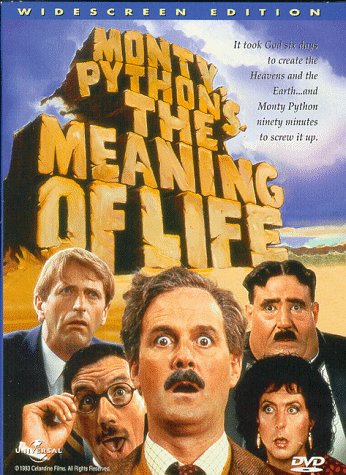Monty Python's The Meaning of Life

Monty Python's The Meaning of Life | ||
 |
Director: | Terry Gilliam, Terry Jones | Actors: | Graham Chapman (as Fish #1/Obstetrician/Harry Blackitt/Wymer/Hordern/General/Narrator #2/Dr. Livingstone/Strange Woman/Eric/Coles/Chairman/Guest #4/Arthur Jarrett/Geoffrey/Tony Bennett), John Cleese (as Fish #2/Dr. Spenser/Humphrey Williams/Sturridge/Ainsworth/Waiter/Man/Maitre D/Grim Reaper), Terry Gilliam (as Fish #4/Walters/Zulu Announcer/M'Lady Joeline/Mr. Brown/Howard Katzenberg), Eric Idle (as Fish #3/Singer/Mr. Moore/Mrs. Blackitt/Watson/Atkison/Perkins/Victim #3/Front End/Mrs. Hendy/man in Pink/Noel Coward/Gaston/Angela), Terry Jones (as Fish #6/Mum/Priest/Biggs/Sergeant/Strange Man/Mrs. Brown/Mr. Creosote/Maria/Bert/Leaf #1/Fiona Portland-Smyth), Michael Palin (as Fish #5/Mr. Pycroft/Dad/Narrator #1/Chaplain/Carter/Spadger/Sargeant Major/Pakenham-Walsh/Rear End/Lady Presenter/Mr. Marvin Hendy/Harry/Padre/Debbie Katzenberg), Carol Cleveland (as Waitress, First), Simon Jones (I) (as Jeremy Portland-Smythe), Patricia Quinn (I) (as Mrs. Williams), Judy Loe (I) (as First Nurse), Andrew MacLachlan (as Groom,), Mark Holmes (I) (as A Severed Head,), Valerie Whittington (as Mrs. Moore), Jennifer Franks (as Bride), Imogen Bickford-Smith (as Second Nurse) | Country: | UK | Category: | Comedy | Year: | 1983 |
| Description: | The comedy team takes a look at life in all its stages in their own uniquely silly way. | Comments: | WARNING: REVIEW CONTAINS SPOILERS. As a Monty Python film this is preferable to most, largely because it's their sole film (using original material, at any rate) that returns to the sketch-based format. Whereas Holy Grail and Life of Brian had tried to adopt feature-length narratives, Meaning of Life is divided into eight sub-sections, as well as "The End of the Film" and the amusing "Middle of the Film". The humour present is perhaps more appealing to non-fans, as a sticking point is the Pythons' continual obsession with intellectualising trivial issues. Here they trivialise intellectual issues, which is far more satisfying. As with any Python activity, it's really very hit and miss, and there are plenty of misses. The end, for one. A rant by Terry Jones at the then-current state of the film industry seems a bit like pots and kettles, and the second section, "Growth and Learning" just goes too full out to shock. In fact, most of the film is like this, with a juvenile need to offend, which is odd considering even the youngest Python was forty at this stage. Yet this urge to break every last taboo gives us digs at Catholics, Protestants, Mormons, Jews, Africans and Americans. We get women talking openly about their periods and young naked children discussing reproduction with their father. There are also some gratuitous topless shots at the end, though I won't complain about that part too much. At the time it was all probably very risqu� and daring, though it seems strangely tame, and even inept these days. The opening mini-feature, The Crimson Permanent Assurance, seems a gracious attempt by the team to allow Gilliam a Brazil try-out. It's nicely directed (better than the main film, in fact) though doesn't really go anywhere, or indeed be funny at all. It ends with a song, feebly playing on the words Accountancy/Accountant Sea. Still, it only lasts fifteen minutes I suppose... The opening proper is a ghastly sketch with Cleese as a heartless Doctor, saying lines like "Can I put the tube in the baby's head?" Cleese... posh bloke that shouts... no, I still don't get why that's supposed to be funny. But there is a fair amount of good stuff in there, if not exactly side-splitting. The one bit that did make me laugh out loud was the least sophisticated moment, and arguably the most famous, the Mr. Creosote restaurant scene. An insanely obese man who vomits everywhere (including four times over the back of a cleaning lady) this puerile, gross-out humour is undeniably amusing. This then leads on to another great moment, Eric Idle's French waiter leading the camera away to explain his philosophy on the meaning of life. Having explained it and seeing the underwhelmed response, Idle starts screaming at the camera, telling us what to do if we don't like it. "Fighting Each Other" is another nice segment, with three brief satires on war. Perhaps the best is where an army captain, trying to fight his way out of a bunker, is given gifts by his regiment. Seeing Chapman trying to avoid enemy fire while being presented with a full-length grandfather clock is an amusing touch. Idle appears as an embittered Scots soldier, bemoaning the fact that a soldier can shoot people and be praised for it, but a civilian cannot. "At home they'd hang me. Here they'll give me a f*****g medal!" My favourite bit though has to be Eric stepping from a fridge in a neon pink suit, walking out into space while singing "Galaxy Song". It's not particularly funny, but it does get across some of the sense of scale and wide scope that makes this film rewarding. Well, it would if it didn't also highlight the film's modest budget. There's also an Oliver! spoof and a mickey-take of Johnny Mathis to contend with. Gilliam oddly only gets one sustained cartoon, a nice sketch about leaves committing suicide. Okay, it all could have been a lot better. Despite what their fans would have you think, "quality control" are two words unlikely to have troubled the Pythons. But this is a refreshing change of tack for the group, even down to Idle's Noel Coward take off. Usually Coward in Python would have sung about currency or foreign politics, but here he just gets to reel off a ditty about penises. It's this no-limits, full-bore attitude that makes for interesting, if not actually all that funny, viewing. And as the final Python film, then the ultimate question of life itself was a subject they were long overdue in tackling. 6/10. |
Languages: | English | Subtitles: | Length: | 107 | Video format: | Audio format: | Resolution: | Files sizes: | 1023 |